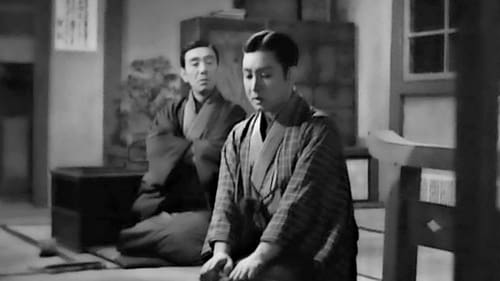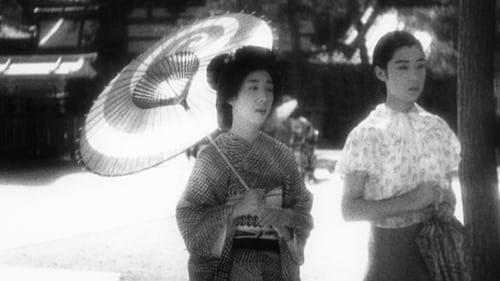
Jidai-geki about the life of Yasubei Nakayama, a famous ronin who did participate in the revenge against Lord Kira Yoshinaka as detailed in Japan's famous epic Chushingura

Journalist
A film by Kiyoshi Saeki

Tanuma Kandayuu is a high class samurai of the house of Nabeshima. He finds a lavish board of Go (a Chinese Board game) at Kinbei's store. He recommend Kinbei to offer it to his lord. Kinbei hesitates at first, since he knows the board has a mysterious legend surrounding it; it's believed that for every game played on the board, one death is required.

Shizuko Kasagi and Hideko Takamine star as young women who try to raise money for a needy old friend by becoming wandering singers who work for tips in Tokyo's Ginza nightlife district.

A love triangle among a girl, her poor boyfriend, and a rich company president.

Gosuke
The Way of Drama unfolds in the world of kabuki in Osaka, but also addresses the politics of popular culture and the rivalry between theatrical styles like those used by amateur actors to dramatise contemporary events.

Koshirô Nomiya
This epic depicts the battle between Uesugi Kenshin and Takeda Shingen. The focus of the story is the struggle by the unit leader in charge of the main supply wagons and the supply troops to transport materiel to the Uesugi army. To this are added episodes involving an itinerant woman.

Jurobei, a kaisen tonya (wholesaler in port) in Awa, was wronged and killed on the day of the Dance Festival by the evil merchant & the chamberlin. His brother (Kazuo Hasegawa) vowed vengeance on the day of his brother's death. So every year the villains are worried during the Awa Dance Festival (which is part of the Obon festival), but nothing has ever happened, until seven years later...

The story is based on the serial novel by Tsunoda Kikuo.

Masa-chan's father
A Fond Face from the Past is also set in a rural community, specifically a village outside Kameoka, near Kyoto. In some ways this short, thirty-six-minute film is Naruse's most moving negotiation of the militarist restrictions of the time, perhaps because it is also his most direct engagement with the culture of war. When a newsreel comes to Kameoka featuring a local man named Yoichi, it causes some excitement in the community and, of course, in Yoichi's own family. First of all his mother makes the newsreel (Nippon News, no. 14), which begins with the same marching music that opens his own film, followed by a curious baby judging context in Los Angeles featuring two hundred Japanese babies. Released in January 1941, almost a year before the pacific war begins, this “found footage” is indicative of Japanese imperialist ambitions beyond Asia long before Pearl Harbor.

The story is based on the serial novel by Tsunoda Kikuo.

Jidaigeki from 1940

Japanese war movie

Jurakudo, the antiques dealer
교토 기온의 유명한 게이샤 자매인 우메키치와 아야코. 언니 우메키치는 인정 많고 헌신적이며, 동생 오모차는 당차고 야무져 남자는 돈줄이라 여긴다. 어느 날, 파산한 뒤 아내를 떠난 후루사와가 우메키치를 찾아오고, 그녀는 그를 받아들여 돌보기 시작한다. 그런 언니를 이해할 수 없는 오모차는 후루사와를 내쫓기 위해 애쓴다. 같은 해 공개되었던 와는 여러 면에서 공통점을 보여 두 작품은 ‘자매’라 일컬어진다. 남성 중심의 가부장적 사회에서 상처 받고 능멸당하는 여성을 통해 당대 일본의 어두운 면모를 냉정하게 포착한 걸작. (2016 영화의 전당 - 미조구치 겐지 60주기 특별전)







